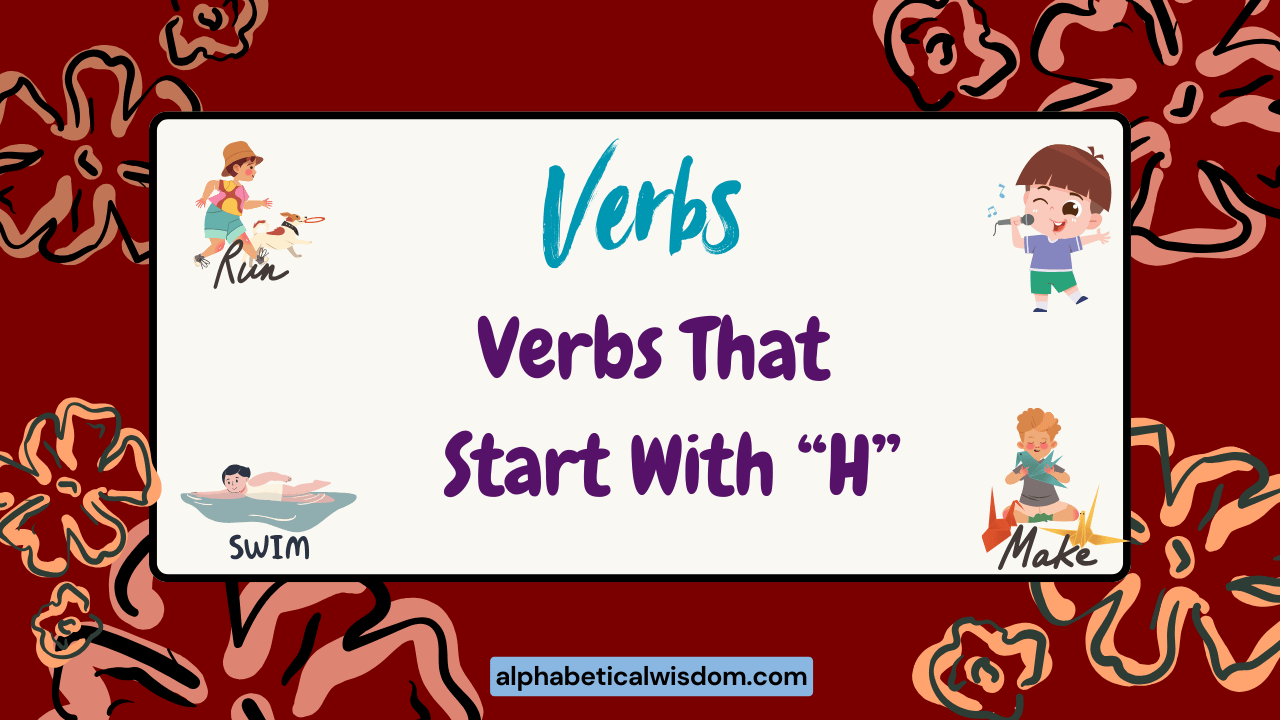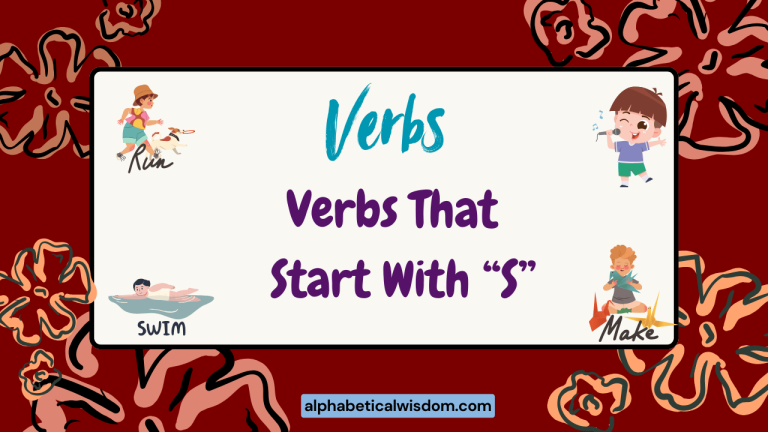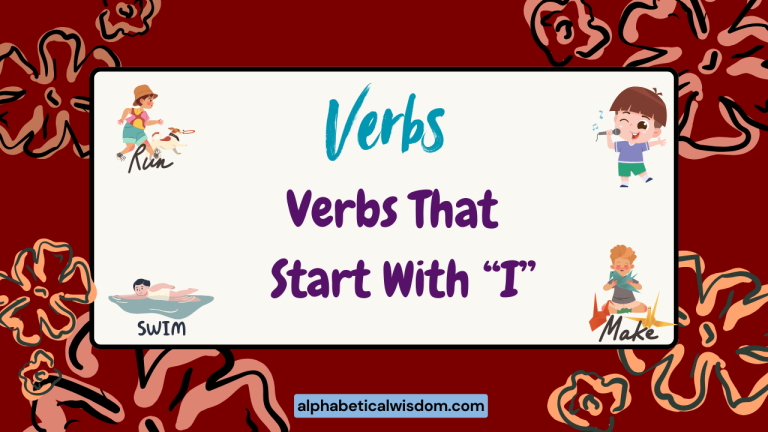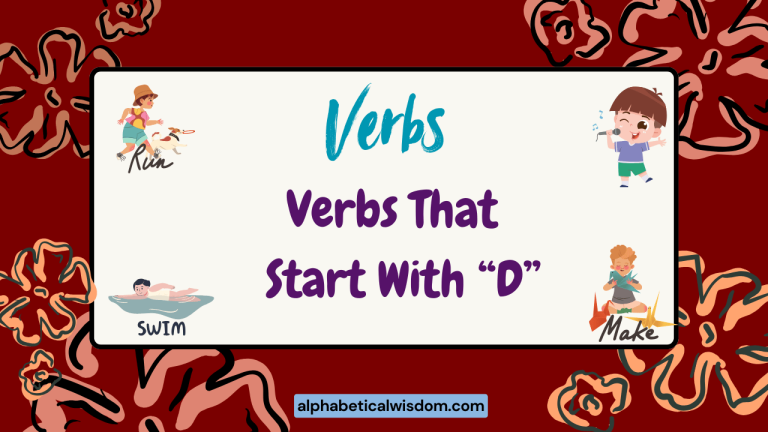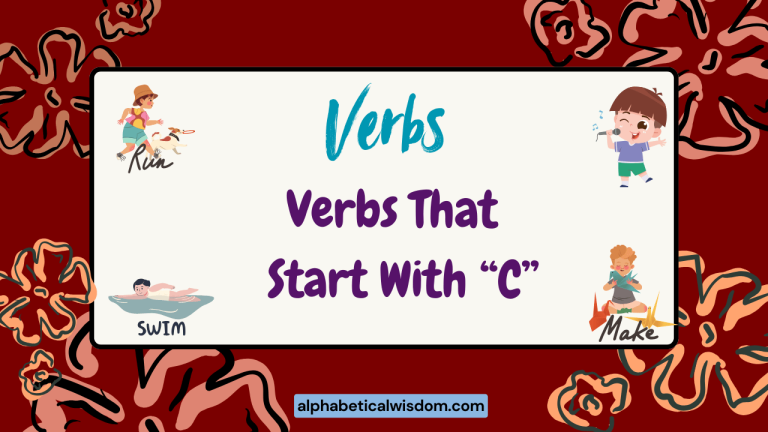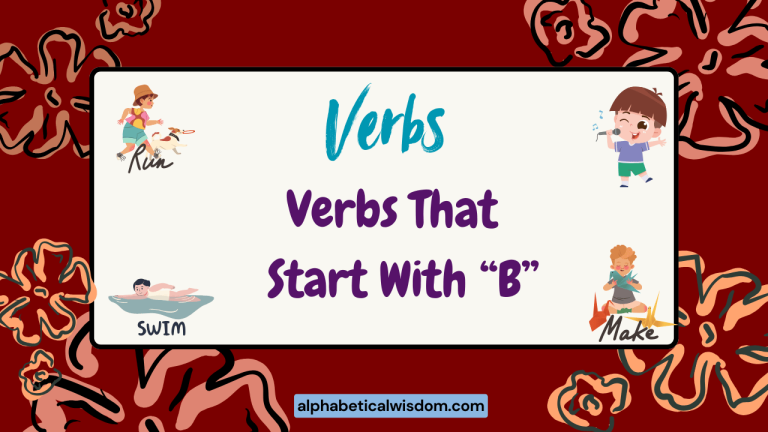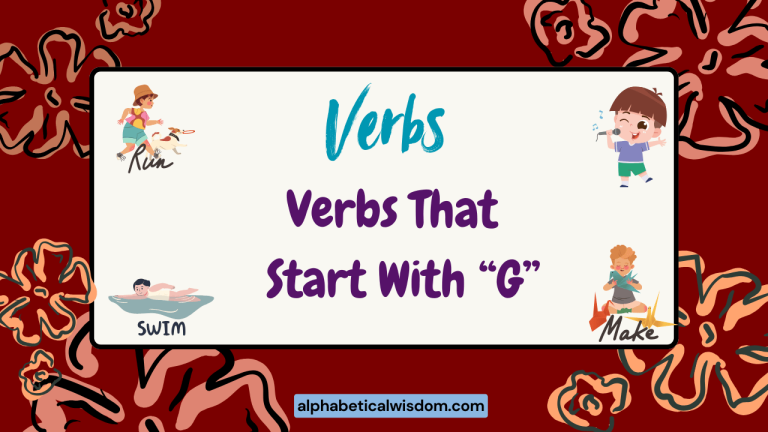Verbs That Start With H: A Comprehensive Grammar Guide
Verbs are the engine of language, driving sentences and conveying action, occurrence, or state of being. Mastering verbs, particularly those beginning with specific letters like “H,” is crucial for enhancing both written and spoken communication.
This article provides a comprehensive exploration of verbs starting with “H,” offering detailed explanations, examples, and practical exercises suitable for English language learners of all levels. Understanding these verbs will significantly improve your vocabulary, grammar accuracy, and overall fluency in English.
Table of Contents
- Introduction
- Definition of Verbs Starting With H
- Structural Breakdown
- Types and Categories of Verbs Starting With H
- Examples of Verbs Starting With H
- Usage Rules for Verbs Starting With H
- Common Mistakes with Verbs Starting With H
- Practice Exercises
- Advanced Topics
- Frequently Asked Questions
- Conclusion
Definition of Verbs Starting With H
A verb is a word used to describe an action, state, or occurrence, and verbs starting with “H” are simply those verbs that begin with the letter “H.” These verbs, like all verbs, play a fundamental role in constructing sentences, providing the essential element of predicate. They indicate what the subject of the sentence is doing, being, or experiencing.
Verbs that start with “H” are diverse in their meanings and applications, ranging from common actions like “have” and “help” to more specialized terms like “hoist” or “harangue.”
The classification of “H” verbs follows the same principles as any other verb. They can be categorized based on their function (action, linking, auxiliary), transitivity (transitive, intransitive), and regularity (regular, irregular).
Understanding these classifications is crucial for using these verbs correctly in various contexts.
The context in which a verb starting with “H” is used determines its specific meaning and grammatical role. For instance, “have” can function as a main verb indicating possession or as an auxiliary verb forming perfect tenses.
Recognizing these contextual variations is key to mastering the use of “H” verbs effectively.
Structural Breakdown
The structure of verbs starting with “H” follows standard verb conjugation patterns in English. Regular verbs form their past tense and past participle by adding “-ed” (e.g., “happen” -> “happened”), while irregular verbs have unique forms (e.g., “have” -> “had”).
Understanding these patterns is essential for correct verb usage.
A crucial aspect of verb structure is subject-verb agreement. The verb must agree in number (singular or plural) with its subject.
For example, “He has” (singular) versus “They have” (plural). This agreement ensures grammatical correctness and clarity in sentences.
Verbs are also inflected to indicate tense (present, past, future). “H” verbs are no exception.
For example, “He helps” (present), “He helped” (past), and “He will help” (future). Each tense conveys a different temporal aspect of the action or state.
Types and Categories of Verbs Starting With H
Action Verbs
Action verbs describe what someone or something does. They show physical or mental actions.
Many verbs starting with “H” fall into this category.
For example, “hit,” “hold,” “hunt,” and “hear” are all action verbs that begin with the letter H. They describe concrete actions that can be observed or experienced.
Linking Verbs
Linking verbs connect the subject of a sentence to a noun or adjective that describes or identifies the subject. “H” verbs that function as linking verbs are less common but still exist.
For instance, the verb “happen” can sometimes act as a linking verb, connecting the subject to a state or condition. Example: “That happens to be true.” Here, “happens” links “that” to the descriptive phrase “to be true.”
Auxiliary Verbs
Auxiliary verbs, also known as helping verbs, assist the main verb in a sentence. They help to form different tenses, moods, and voices.
The most prominent “H” auxiliary verb is “have.”
“Have” is used to form perfect tenses (present perfect, past perfect, future perfect). For example: “I have finished my work,” “She had already left,” “They will have arrived by then.”
Transitive and Intransitive Verbs
Transitive verbs require a direct object to complete their meaning. The action of the verb is transferred to the object.
Intransitive verbs, on the other hand, do not require a direct object.
Consider “help.” In the sentence “He helps his mother,” “helps” is transitive because it takes the direct object “his mother.” However, in the sentence “He helps regularly,” “helps” is intransitive because it does not have a direct object.
Regular and Irregular Verbs
Regular verbs form their past tense and past participle by adding “-ed.” Irregular verbs have different forms that do not follow this pattern. “H” verbs can be either regular or irregular.
Examples of regular “H” verbs include “happen” (happened), “hammer” (hammered), and “handle” (handled). The irregular verb “have” (had) is a prime example of a verb starting with H that does not conform to conventional verb conjugation rules.
Examples of Verbs Starting With H
Common Verbs
The following table provides examples of common verbs starting with “H,” along with example sentences to illustrate their usage. These verbs are frequently used in everyday conversation and writing.
| Verb | Example Sentence |
|---|---|
| Have | I have a new car. |
| Help | Can you help me with this? |
| Hear | I can’t hear you clearly. |
| Hit | He accidentally hit the ball too hard. |
| Hold | Please hold my bag for a moment. |
| Hope | I hope you have a great day. |
| Happen | Accidents happen all the time. |
| Hate | I hate being late. |
| Handle | She can handle any situation. |
| Hang | Let’s hang out this weekend. |
| Hurry | You need to hurry if you want to catch the bus. |
| Heal | Time will heal all wounds. |
| Hide | The children like to hide in the garden. |
| Hire | The company plans to hire more employees. |
| Haunt | The old house is said to be haunted. |
| Harm | He would never harm anyone. |
| Harvest | Farmers harvest the crops in the fall. |
| Hush | Please hush, the baby is sleeping. |
| Hover | The helicopter hovered over the city. |
| Hum | She likes to hum while she works. |
| Hail | The crowd hailed the victorious team. |
| Halt | The police halted the traffic. |
| Hamper | The rain hampered our plans for a picnic. |
| Hand | Please hand me the book. |
| House | The museum houses a collection of ancient artifacts. |
Less Common Verbs
The following table provides examples of less common verbs starting with “H,” along with example sentences to illustrate their usage. While not as frequently used as the verbs in the previous table, these verbs are still valuable for expanding your vocabulary and understanding more nuanced language.
| Verb | Example Sentence |
|---|---|
| Harangue | The speaker harangued the audience for hours. |
| Hinder | The snow hindered our progress. |
| Hoard | Some people hoard unnecessary items. |
| Hone | She wants to hone her skills in painting. |
| Hoodwink | The con artist tried to hoodwink the elderly woman. |
| Hack | Someone tried to hack into the company’s database. |
| Hallow | The church was hallowed many years ago. |
| Hanker | He hankered for the days of his youth. |
| Hap | It happed that we were in the same city that day. |
| Hark | Hark, I hear a noise in the garden. |
| Harry | The enemy soldiers harried the retreating troops. |
| Hatch | The birds are about to hatch their eggs. |
| Hawl | The captain had to hawl the ship into the harbor. |
| Heave | They had to heave the heavy box onto the truck. |
| Hedgerow | The villagers hedgerowed their fields to protect them from the wind. |
| Hightail | We had to hightail it out of there before the storm hit. |
| Hill | They hilled the potatoes to protect them from the sun. |
| Hitch | We had to hitch a ride to the next town. |
| Hobble | The old man hobbled down the street. |
| Hoist | They had to hoist the flag up the pole. |
| Holler | He had to holler to be heard over the crowd. |
| Honeymoon | They honeymooned in Hawaii. |
| Hornswoggle | He tried to hornswoggle me into buying a used car. |
| Horselaugh | The audience horselaughed at the comedian’s jokes. |
| Hotfoot | I had to hotfoot it to the meeting. |
Usage Rules for Verbs Starting With H
Tense and Subject-Verb Agreement
Ensuring correct tense and subject-verb agreement is crucial for using verbs starting with “H” accurately. The tense of the verb must be consistent with the time frame of the action, and the verb must agree in number with its subject.
Here are some examples illustrating correct tense and subject-verb agreement:
- Present Tense: He has a book. (Singular subject, singular verb)
- Past Tense: They had a party. (Plural subject, past tense verb)
- Future Tense: I will help you tomorrow. (Singular subject, future tense verb)
Incorrect tense or subject-verb agreement can lead to confusion and grammatical errors. For example, “He have a book” is incorrect because the singular subject “He” requires the singular verb form “has.”
Modal Verbs with H
Modal verbs are auxiliary verbs that express possibility, necessity, permission, or ability. While there aren’t many modal verbs that begin with ‘H’, understanding how modals interact with verbs starting with ‘H’ is important.
For example, consider the modal verb “should.” You might say, “You should help your neighbor.” Here, “should” modifies the verb “help,” indicating a recommendation or obligation.
Another example: “He has to finish his work.” In this case, “has to” acts as a modal verb expressing necessity, modifying “finish.” While ‘has’ is the H verb, it’s functioning as part of a modal construction.
Phrasal Verbs with H
Phrasal verbs consist of a verb and a particle (preposition or adverb) that together create a new meaning. Many phrasal verbs start with “H,” and understanding their meanings is essential for fluent English.
Here are some examples of phrasal verbs starting with “H”:
- Hang out: To spend time relaxing (e.g., “Let’s hang out this weekend.”)
- Hold on: To wait (e.g., “Please hold on for a moment.”)
- Head off: To start a journey or intercept someone (e.g., “We need to head off early to avoid traffic.”)
- Hurry up: To move faster (e.g., “Hurry up, we’re going to be late.”)
The meaning of a phrasal verb is often different from the individual meanings of the verb and particle. Therefore, it’s important to learn phrasal verbs as separate vocabulary items.
Common Mistakes with Verbs Starting With H
One common mistake is confusing the past tense and past participle forms of irregular verbs like “have.” The correct past tense is “had,” and the past participle is also “had.” For example:
- Incorrect: I have went to the store.
- Correct: I have gone to the store.
Another common mistake is incorrect subject-verb agreement. Ensure that the verb agrees in number with its subject.
For example:
- Incorrect: He have a car.
- Correct: He has a car.
Misusing phrasal verbs starting with “H” is also a frequent error. Remember that the meaning of a phrasal verb is often different from the individual meanings of its components.
For example:
- Incorrect: I will hang the picture from the wall. (Using “hang” literally)
- Correct: Let’s hang out this weekend. (Using “hang out” as a phrasal verb)
Here is a table showing more common mistakes:
| Incorrect | Correct | Explanation |
|---|---|---|
| She have a dog. | She has a dog. | Subject-verb agreement. Singular subject “She” requires singular verb “has.” |
| I have saw that movie. | I have seen that movie. | Incorrect past participle form of “see.” |
| He holded the door open. | He held the door open. | “Hold” is an irregular verb; past tense is “held,” not “holded.” |
| They are hope to win. | They are hoping to win. | Incorrect verb form. Requires the present participle “hoping.” |
| We must to hurry. | We must hurry. | Modal verbs like “must” do not require “to.” |
| He has eat already. | He has already eaten. | Incorrect word order and verb form. “Already” goes before past participle “eaten.” |
| I am hear you. | I hear you. | “Hear” is a stative verb; continuous form “am hearing” is less common. |
| She hitted the ball. | She hit the ball. | “Hit” is an irregular verb; past tense is “hit,” not “hitted.” |
| He don’t has time. | He doesn’t have time. | Incorrect auxiliary verb. Singular subject “He” requires “doesn’t.” |
| We have be there. | We have to be there. | Missing “to” after “have” to express obligation. |
Practice Exercises
Complete the following sentences with the correct form of the verb starting with “H” in parentheses.
- I _______ (hope) to see you soon.
- She _______ (have) a lot of work to do.
- They _______ (hear) a strange noise last night.
- He _______ (hit) the nail with a hammer.
- We _______ (hold) a meeting every week.
- It _______ (happen) to rain yesterday.
- I _______ (hate) being late for appointments.
- She _______ (handle) the situation very well.
- They _______ (hang) the picture on the wall.
- You need to _______ (hurry) if you want to catch the train.
Answers:
- hope
- has
- heard
- hit
- hold
- happened
- hate
- handled
- hung
- hurry
Exercise 2: Fill in the blanks with the appropriate form of the verb in parentheses.
- The old house is said to be _______ (haunt).
- He would never _______ (harm) anyone.
- Farmers _______ (harvest) the crops in the fall.
- Please _______ (hush), the baby is sleeping.
- The helicopter _______ (hover) over the city.
- She likes to _______ (hum) while she works.
- The crowd _______ (hail) the victorious team.
- The police _______ (halt) the traffic.
- The rain _______ (hamper) our plans for a picnic.
- Please _______ (hand) me the book.
Answers:
- haunted
- harm
- harvest
- hush
- hovered
- hum
- hailed
- halted
- hampered
- hand
Exercise 3: Choose the correct verb from the options provided:
| Question | Options | Answer |
|---|---|---|
| They (have/has) a new car. | have / has | have |
| She (hear/hears) a noise outside. | hear / hears | hears |
| He (hit/hitted) the ball very far. | hit / hitted | hit |
| We (hold/holds) a meeting every Monday. | hold / holds | hold |
| It (happen/happens) all the time. | happen / happens | happens |
| I (hate/hates) being late. | hate / hates | hate |
| The company (hire/hires) new employees every year. | hire / hires | hires |
| The birds (hatch/hatches) their eggs in the spring. | hatch / hatches | hatch |
| He (heave/heaves) a sigh of relief. | heave / heaves | heaved |
| They (holler/hollers) for help. | holler / hollers | hollered |
Advanced Topics
Subjunctive Mood
The subjunctive mood expresses hypothetical or conditional situations. While less common in modern English, it’s important for advanced learners. With ‘H’ verbs, the subjunctive might appear in constructions with ‘have’. For example: “I suggest that he have the report finished by Friday.” Here, “have” is in the subjunctive mood, expressing a suggestion or requirement.
Another example might be: “It is essential that she help with the project.” Here, “help” is in the subjunctive mood, conveying the necessity of her assistance.
Idiomatic Expressions
Idiomatic expressions are phrases whose meanings cannot be understood from the literal meanings of the individual words. Many idiomatic expressions contain verbs starting with “H.”
Examples include:
- Have a blast: To have a great time.
- Hit the books: To study hard.
- Hold your horses: To wait a moment.
- Have a heart: To be compassionate.
Learning idiomatic expressions can greatly enhance your understanding and use of English.
Frequently Asked Questions
- What is the difference between “have” and “has”?
“Have” is used with plural subjects (I, you, we, they) and “has” is used with singular subjects (he, she, it). - How do I know if a verb starting with “H” is transitive or intransitive?
A transitive verb requires a direct object, while an intransitive verb does not. If the verb’s action is directed towards something or someone, it is transitive. For instance, “He helped *his friend*” (transitive) vs. “He helps frequently” (intransitive). - What are some common phrasal verbs starting with “H”?
Common phrasal verbs include “hang out,” “hold on,” “head off,” and “hurry up.” - How do I use “have” as an auxiliary verb?
“Have” is used to form perfect tenses. For example, “I have finished my work” (present perfect), “She had already left” (past perfect), and “They will have arrived by then” (future perfect). - What are some examples of regular verbs starting with “H”?
Examples of regular verbs include “happen” (happened), “hammer” (hammered), and “handle” (handled). - What are some examples of irregular verbs starting with “H”?
“Have” (had) is the most common irregular verb starting with “H.” - How can I improve my vocabulary of verbs starting with “H”?
Read widely, use a dictionary and thesaurus, and practice using new verbs in sentences. - Why is subject-verb agreement important?
Subject-verb agreement ensures grammatical correctness and clarity in sentences. It helps avoid confusion and makes your writing more professional. - How do I use the subjunctive mood with verbs starting with ‘H’?
The subjunctive mood is used to express hypothetical or conditional situations. For instance, “It is essential that she help with the project.” - Where can I find more exercises to practice using verbs starting with “H”?
Many online grammar resources and textbooks offer additional exercises for practicing verb usage. Practicing with varied exercises will solidify your understanding.
Conclusion
Mastering verbs that start with “H” is an essential step in improving your English language skills. This article has provided a comprehensive overview of these verbs, including their definitions, types, usage rules, and common mistakes.
By understanding these concepts and practicing regularly, you can enhance your vocabulary, grammar accuracy, and overall fluency in English. Remember to pay attention to subject-verb agreement, tense consistency, and the correct use of phrasal verbs.
Continue to expand your vocabulary by reading widely and actively seeking out new verbs. Use online resources and practice exercises to reinforce your understanding.
With consistent effort and dedication, you will become proficient in using verbs starting with “H” and elevate your English language proficiency.
